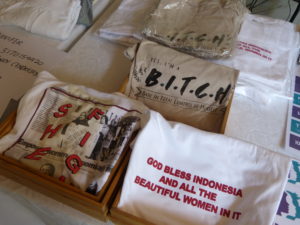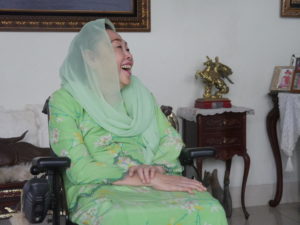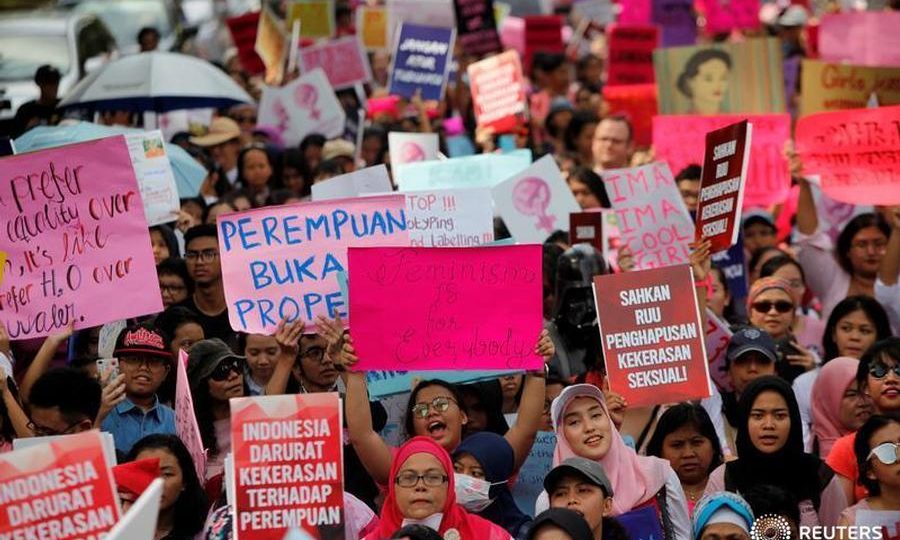Photos, video and text by Olivia Stanley and Tiffanie Turnbull
In the one year since the first Jakarta Women’s March on March 4, 2017, there has been both heartening progress and disturbing setbacks in the field of women’s rights in Indonesia. We talked to some of the country’s leading feminist voices, including the organizers of last and this year’s rally, as well as former First Lady Sinta Nuriyah Wahid, in the lead-up to the 2nd Jakarta’s Women’s March on March 3, to hear what they had to say about the state of women’s rights in Indonesia today.
Openly declaring yourself a feminist in Indonesia is rarely easy. Although there have been many here fighting for women’s rights since before the nation’s founding, “feminism”, as a term, is still framed as a suspicious cultural import from the West that is fundamentally incompatible with traditional Indonesian values (putting it in the same category as other ideas scorned by many Indonesians, like LGBT rights or even communism).
So while feminists in the West have been wearing ’pussyhat’ beanies and proudly declaring ‘this is what a feminist looks like’ without much fear of reprisal, in Indonesia that kind of bold symbolic embrace of female autonomy could make you a target, in more ways than one.
But on March 3, ahead of International Women’s Day, the second-ever Jakarta Women’s March will embrace strength in numbers, with the hope of drawing out around 2,000 feminists to march through the heart of the capital.

Kerri na Basaria, the head of the 2018 organizing committee, knows that feminism faces many challenges here, but is determined to fight for the cause. She explains that last year’s march drew a crowd of around 800 and they’re estimating to at least double this time round.
“There are a lot of young women, and young men as well, who are up-and-coming [feminist activists] … a lot of [people] are very much aware of the situation,” the 26-year-old said.
In its inaugural year, the march followed in the footsteps of the Womens March protests; a reaction to the election of US President Donald Trump, which then spread worldwide.
The committee has since regrouped and aims to expand on last year’s success by bringing feminism to a broader audience.
“Last year was more of a realization that we’ve been too negligent about resistance,” she said, describing the state of women’s rights here as simply “abysmal.”
“This year is us, actively fighting for it.”
The movement isn’t just restricted to the capital either. Marches are being organised in 12 other cities across the archipelago, from Salatiga to Serang.
There is no doubt that the global trend towards increasing awareness of women’s issues, such as the #MeToo movement, has helped rally more and more Indonesian women to the cause.
Indeed, in recent months there seems to have been a marked increase in the number of young women reporting sexual harassment and assault, something they might not have done before due to shame, cultural taboos and the likelihood of victim-blaming.
But while progress is certainly being made on many fronts, women’s rights activists here face some staggering statistics. In some areas of East Java, half of all girls are married before 18. More than 41% of Indonesian women have reported experiencing some form of physical, social, economic and/or emotional violence. An estimated 60 million women have undergone female genital mutilation.
Kate Walton, an Australian activist who has been working in the area of women’s rights in Indonesia for several years and founded the Jakarta Feminist Discussion Group, believes key areas to address are in women’s health and livelihood.
Her project Menghitung Pembunuhan Perempuan (Counting Dead Women) works to document violence against women nationwide. In 2017, it counted 173 women murdered. Almost half were killed by their current or former intimate partners, and 98% of the murders were perpetrated by men.
Initial data analysis for 2017 for Menghitung Pembunuhan Perempuan, my project which counts murdered women in Indonesia: 173 women were killed in 2017. 71 (41%) were killed by current/former intimate partners. 35 (20%) were 18 or under. Only 4 (2%) were killed by other women.
— Kate Walton (@waltonkate) January 16, 2018
Beyond the disturbing data, feminism faces a hurdle more difficult to quantify but equally daunting: a general sense that conservatism, fundamentalism and nationalism are all on the rise and all aimed at preserving the patriarchal status quo.
Walton said the growing influence, both politically and culturally, of hardline religious fundamentalist groups is the main challenge towards achieving more for women’s rights in Indonesia.
Indeed, the growing influence of Islamist hardliners like the Islamic Defenders Front (FPI) and the recently outlawed Hizbut Tahrir have reshaped much of the country’s political landscape. Last year, a hardliner smear campaign against the Christian former Jakarta Governor Basuki “Ahok” Tjahaja Purnama, ended with him losing the election and being jailed for blasphemy.
Former First Lady Sinta Nuriyah, the widow of former President Abdurrahman Wahid, has degrees in both Sharia law and women’s studies and is considered one of the country’s greatest champions of women’s rights and plurality.

Sinta says those who use the Quran to discredit feminism as a Western idea that is incompatible with Islam are just plain wrong.
“These [radical groups] misuse religious texts and teachings to say that women should only be at home; doing housework; chores; and taking care of their husbands and children,” she said.
The former first lady said that the Quran promotes equality between men and women and that it is not the holy book’s verses, but how they have been interpreted, that has held back women’s rights. She said modern reinterpretations of Quranic verses are needed to once again emphasize Islam’s inherently moderate and feminist ideals.
Feminists argue there are also many misconceptions about what feminism actually is, leading to the stigmatization of those who openly identify with it.
Olin Monteiro, organizer of last year’s march and a veteran activist, said that religious fundamentalist and nationalist groups denounce feminism as a ‘Western’ and ‘liberal’ ideology in order to curb its influence.
But she argues feminism has roots in Indonesian that stretch back long before contact with the West.
“In Indonesia, we have a lot of strong female heroes [many of whom] have not yet been mentioned by our history, or by any publication.”
“That is feminism, feminism is the idea of making sure women’s voices are heard in society, and that women’s positions are equal to men in any sector of life,” said Monteiro.
“I think we actually have to return to that kind of ‘archipelago feminism’.”
It’s unlikely that Indonesia’s feminists will be able to clear all of the hurdles they face today, such as changing perceptions and challenging conservatism, anytime in the near future.
But this year’s march will be a good indicator of the movement’s potential to keep the fight going and grow stronger. A larger turnout of young participants, as the organizers hope for, will indicate a future generation of activists ready to battle for the cause.
Right now, the future remains unwritten for feminism in Indonesia. It will be today’s youth that writes it.









